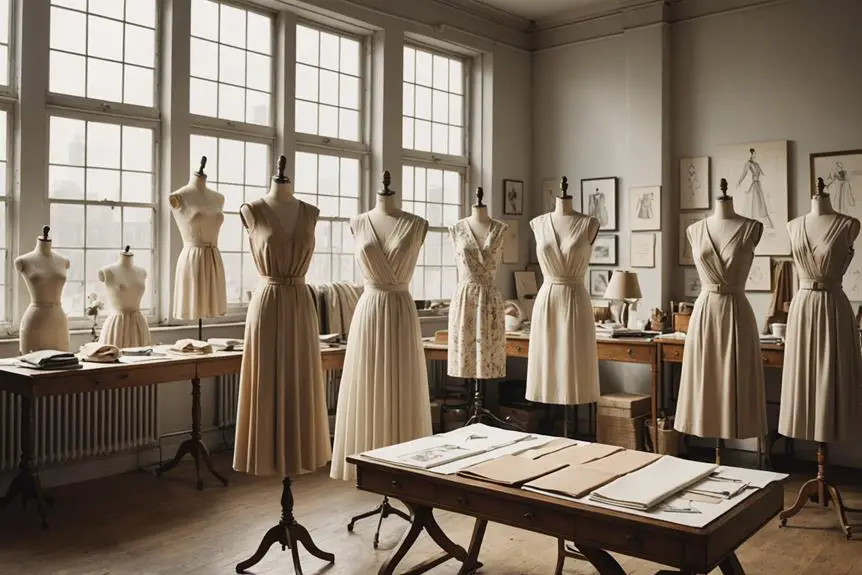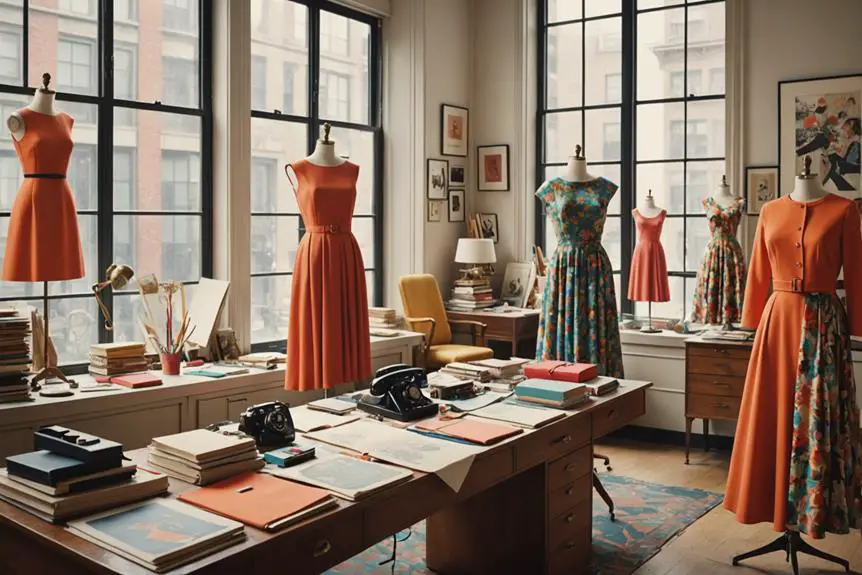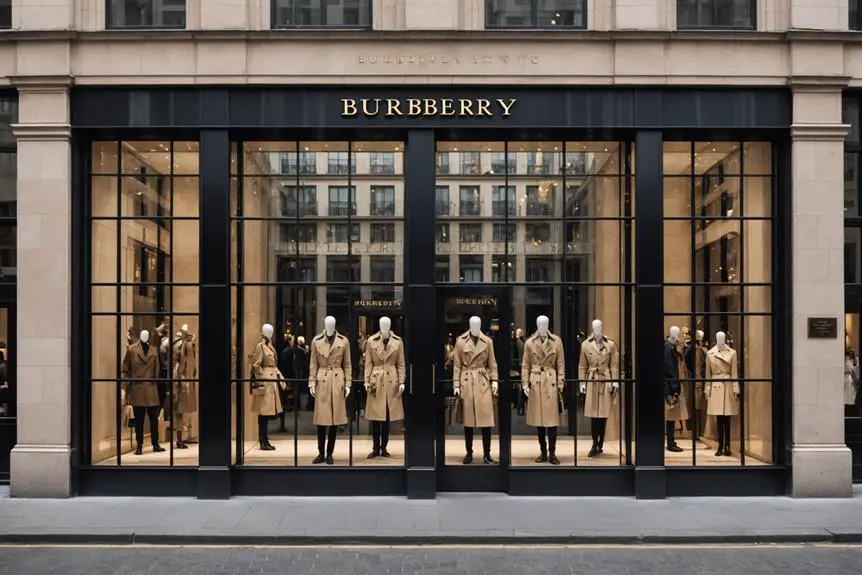Anne Klein, a pioneering fashion brand founded by designer Hannah Golofski in 1968, transformed women's fashion with a focus on comfort and functionality. The brand emerged from Klein's early studies at the Traphagen School of Fashion and her collaboration in a design group during the 1940s, laying the groundwork for modern sportswear. Known for its innovative mix-and-match concept, Anne Klein revolutionized wardrobes and provided women with versatile options for self-expression. The brand's commitment to quality fabrics and functional designs has garnered numerous accolades, including recognition in the Fashion Hall of Fame. Anne Klein not only shaped American fashion but also empowered women to embrace their individuality with style. Exploring the brand's legacy reveals profound insights into its lasting influence in the world of fashion.
Early Life and Education

Anne Klein's early life and education played a pivotal role in shaping her future as a renowned fashion designer. Born Hannah Golofski in 1923 in Brooklyn, her family's involvement in the taxi business didn't initially point her toward fashion. However, while attending Girls Commercial High School, you'd see her talent flourish as she discovered her passion for design. This pivotal moment led her to pursue a career in fashion, emphasizing her determination and creative spirit.
In 1937, she earned a scholarship to the prestigious Traphagen School of Fashion, where her skills as a designer were further refined. This education provided her with essential industry knowledge and connections that would later serve her well. Immediately after graduating, Klein entered the garment industry, working at Varden Petites. Here, she introduced the innovative Junior Miss line, catering to young women and solidifying her status as a forward-thinking designer.
Later, her studies at the Fashion Institute of Technology (FIT) immersed her in New York City's dynamic fashion scene, further shaping her design philosophy. Through these formative experiences, Klein carved a path that would lead her to become a significant figure in the fashion world.
Fashion Career Highlights
Fashion Career Highlights
Building on the solid foundation of her education and early experiences in the fashion industry, Klein's career took off in 1940 when she began designing ready-to-wear collections for Maurice Rentner. This pivotal moment laid the groundwork for her innovative approach to women's fashion, which would later become a hallmark of the evolution of Anne Klein logos. In 1944, she co-founded a female design trio that revolutionized American sportswear, establishing key concepts that would shape clothing styles for decades.
In 1948, Klein launched the Junior Sophisticates label, targeting younger women with stylish yet practical clothing options. This initiative not only showcased her understanding of the market but also solidified her reputation as a forward-thinking fashion designer. By 1968, she founded Anne Klein & Company, which rapidly expanded to over 750 stores within a decade, demonstrating her commercial prowess as a clothing manufacturer.
Klein's participation in the 1973 Battle of Versailles fashion show marked a significant moment in her career, elevating the status of American fashion on the global stage. Her ability to blend elegant styles with accessibility redefined women's clothing, leaving a lasting impact that resonates in today's fashion landscape.
Design Philosophy

At the core of Anne Klein's design philosophy lies a profound understanding of women's needs and lifestyles. You'll notice that Klein emphasized comfort and functionality in women's wear, creating pieces that empower you in your daily life. Her ability to blend classic styles with modern trends results in versatile garments, ensuring you can shift effortlessly from day to night.
Klein's pioneering "mix-and-match" concept revolutionized how you coordinate outfits, allowing you to pair separates like blazers and trousers with ease. This approach not only enhances your wardrobe's versatility but also encourages personal expression through fashion. High-quality fabrics and meticulous craftsmanship underpin her designs, ensuring that while you look good, you also enjoy durability and practicality.
Klein believed that "Clothes aren't going to change the world, the women who wear them will." This mantra encapsulates her vision of fashion as a vehicle for empowerment and self-expression. By focusing on comfort and style, she created a legacy that resonates with women who appreciate the balance of aesthetics and functionality in their clothing. Fundamentally, her design philosophy remains a guiding light for women seeking both elegance and practicality.
Legacy and Influence
Klein's impact on women's fashion extends far beyond her innovative designs; it fundamentally reshaped the industry's approach to women's clothing. By introducing versatile separates, she empowered women to curate wardrobes that effortlessly blended comfort and style. This focus on casual elegance and mix-and-match clothing laid the groundwork for the modern woman's wardrobe, influencing how you dress for both professional and personal occasions.
| Element | Impact | Legacy |
|---|---|---|
| Versatile Separates | Revolutionized workwear for women | Empowered personal expression |
| Casual Elegance | Set the standard for modern style | Blended comfort with professionalism |
| Functional Fashion | Addressed contemporary lifestyles | Celebrated women's achievements |
Klein's philosophy, "clothes aren't going to change the world, the women who wear them will," highlights her commitment to empowering women through fashion. This mindset has inspired future generations of designers to prioritize functionality and style. Her induction into the Fashion Hall of Fame solidifies her legacy as a trailblazer who championed not just fashionable attire, but a movement towards functional fashion that resonates with women everywhere.
Recognition and Awards

Recognition in the fashion industry often reflects a designer's influence and innovation, and Anne Klein's accolades certainly underscore her significant contributions. Throughout her career, Klein received multiple Coty American Fashion Critics Awards in 1954, 1955, 1969, and 1971, which highlighted her design excellence and set benchmarks for women's fashion. Her innovative contributions were further acknowledged with the prestigious Neiman Marcus Award in 1959 and 1969, reinforcing her status as a trailblazer.
The Council of Fashion Designers of America (CFDA) also recognized her profound impact, honoring her for her ability to redefine women's fashion with sophistication and practicality. Following her untimely passing in 1974, Klein was inducted into the Fashion Hall of Fame, solidifying her legacy as an icon in the industry.
Today, the Anne Klein brand continues to garner accolades globally, showcasing the enduring influence of her work. This recognition not only reflects her pioneering spirit but also serves as a confirmation of her lasting impact on design excellence within women's fashion, inspiring future generations of designers to innovate and excel in their craft.
Frequently Asked Questions
What Was Anne Klein Known For?
You'll find Anne Klein's legacy in her pioneering mix-and-match clothing concept, emphasizing comfort and versatility. She transformed women's fashion, promoting stylish, practical workwear that empowered women to express themselves confidently in various settings.
Why Is Anne Klein's Logo a Lion?
Anne Klein's logo features a lion to symbolize strength, courage, and empowerment. It reflects your bold independence, connecting high-quality craftsmanship with a modern aesthetic that encourages you to embrace timeless elegance and stylish versatility.
Who Is the Husband of Anne Klein?
Anne Klein's husband was Ben Klein, a clothing manufacturer. They married in 1948 but divorced in 1960. Despite the separation, she maintained her professional identity using the Klein surname throughout her successful career.
How Is Calvin Klein and Anne Klein Related?
Calvin Klein and Anne Klein aren't directly related. They both launched their fashion brands in 1968, greatly shaping women's fashion, yet their approaches differ—Calvin's minimalism contrasts with Anne's mix-and-match philosophy, showcasing diverse influences.





Greetings! Very helpful advice in this particular post!
It is the little changes which will make the greatest changes.
Thanks for sharing!